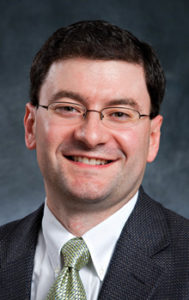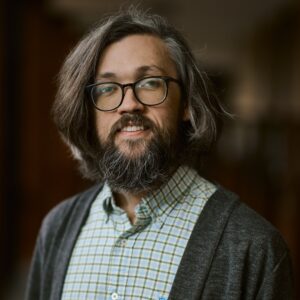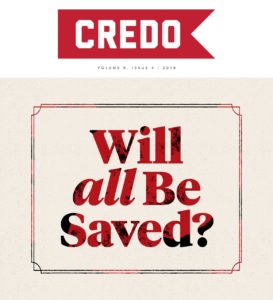Daniel J. Treier is the Gunther H. Knoedler Professor of Theology for Wheaton College. He is a prolific author and has written extensively on evangelical systematic theology, theological interpretation of the Bible, Christology, and cultural engagement. In our conversation with Treier, he gives us insight into evangelicalism, Theological Interpretation of Scripture, Christology, and, most importantly, his favorite baseball team. We hope that this allows our readers to know more personally the man behind the books.
Let’s start with that which is most pressing: You’re a baseball fan. Have you always loved the game? What baseball game sticks in your memory more than any other?
I have been a Detroit Tigers fan from childhood. I grew up listening to Ernie Harwell’s radio broadcasts on the farm in northern Ohio. While I loved to play, especially when I’m catching fly balls from my grandfather and my uncles, even in little league I couldn’t hit. So I simply became a fan, and my most memorable games are two from 1984: Jack Morris’s no-hitter in April, which was amazingly the NBC Game of the Week (otherwise we didn’t get games on TV where I lived), and Game 5 of the World Series when Kirk Gibson hit his famous homer against Goose Gossage.
Your undergraduate degree was in Computer Information Systems. How did you make the jump from technology to theology?
I planned from the beginning to attend seminary and pursue full-time ministry, so the undergrad degree was a way to earn a living on the side as needed and to identify with ordinary life in the pews. As it turned out, I used aspects of the degree while working through graduate school, and some of the modes of thinking probably have provided some analytical skills for doing systematic theology. They’ve certainly informed the administrative work I do. But I never had very strong technical competence; the summer after I graduated, the World Wide Web became a thing …
You’ve been at Wheaton since 2001 and spent time at Trinity Evangelical Divinity School as well, so you know Chicago. Tell us, what bookstore in Chicago can we find you at on your days off?
My long-time favorite, before it recently closed, was the Eerdmans bookstore in Grand Rapids, where I went to seminary. In Hyde Park I’ve visited the Seminary Co-op store a few times, and I used to visit Powell’s there too on my way to Ex Libris, which closed years ago. These days I rarely get to bookstores unless I’m with our daughter at Barnes & Noble.
You have a diverse church background, which includes Methodist, Grace Brethren, Baptist, Evangelical Free, Anglican, and Presbyterian churches – as you describe “evangelical and eclectic.” How has this eclectic background prepared you to teach students at Wheaton?
Wheaton intentionally defines itself with a Statement of Faith rooted in the Reformation’s evangelical heritage, not a denominational identity. So we seek to represent various Protestant traditions within our faculty; in teaching Bible and theology we focus on representing the Statement of Faith winsomely and others’ positions accurately, rather than advocating our own. Having a fairly wide range of church experiences helps with knowing the various traditions somewhat intuitively, not just conceptually. In some cases, I have a reasonable sense of how insiders might view some of their strengths as well as potential weaknesses.
You are a writer. What does your weekly writing habit look like?
I don’t have a weekly writing habit like some of my colleagues do and lots of recommendations suggest. The combo of our family stage and my administrative responsibilities has meant that I read and write when I can, which often means a day or two here and there. Some days I can start early and generate 2000 or 3000 words per day; other days I’m fortunate to write for a couple of hours. If I don’t have at least that much of a possible time horizon, I usually struggle to get going so I will focus instead on revision or research.
One key is to plan in advance how I will start if a good chunk of writing time emerges, so that momentum is possible right away. For instance, this past Monday I was able to write a couple thousand words because Saturday I labored to craft an outline. Today I wasn’t sure how to start, so I’ve been answering these interview questions instead …
I usually mark up books (that I own), and I type detailed notes on sources that may be important for teaching or scholarly projects. Sometimes I write very short summaries—a sentence or two—of each major section of a chapter, trying to capture the major argument in my own words. This accumulated material, and the mental repetition involved in generating it, can provide an intellectual baseline both for classroom answers and for an outlining process that is often my first step of writing. Once a certain framework is in place, I simply start writing prose, later reverse-engineering a more detailed outline as part of the revision process. Most of what I write goes through at least three drafts as I improve the flow of argument and share the material with trusted readers. For all the problems of definition, “evangelical” still seems like a worthy ideal and even a necessary concept. Click To Tweet
Most writers are also avid readers. Who are you currently reading?
Do emails count? … I read almost everything Oliver O’Donovan writes. I teach Dietrich Bonhoeffer regularly, so I reread him frequently. I read much of what mentors like Kevin Vanhoozer and friends like Mike Allen or Scott Swain write, often because they involve me in revision processes along the way. I at least glance at new systematic theologies when they appear, and try to stay aware of new books on hermeneutics, which I teach regularly at the PhD level.
Yet the weight of recent administrative responsibilities, combined with smartphone temptations, has definitely made it challenging to maintain a good quality and quantity of long-form reading. My current project involves Christology, so I’ve been reading lots of “early high Christology” as well as commentaries on key passages over the last few months. I also read whatever I need to read for supervising graduate students, which can be quite diverse. For instance, I’ve read more Latin American Christology this year due to one of my doctoral students.
In the later evenings, I read novels; recently that has meant alternating between academic satires, spy thrillers, and highbrow fiction like Kristin Lavransdatter or Thomas Pynchon’s Mason and Dixon. “Stray” books also lurk at various places around the house, so in the family room I’m chipping away at Carlos Eire’s big book on the Reformation.
Every theologian has mentors in his or her past. Who were yours and how did they influence you?
This list would be very long if I included important pastors, youth leaders, and college professors. In the interests of brevity, I’ll mention a whole host of professors at Grand Rapids Theological Seminary, now either deceased or retired, who modeled scholarly engagement without fear of compromising God’s truth revealed in Scripture. They also modeled the “scholarship of teaching”—a wholehearted commitment to the classroom and their students that probably prevented them from publishing as much as they could have.
Then I have to mention Kevin Vanhoozer, my doctoral supervisor, who has modeled creative engagement with both the truth of the Scriptures and the world of academic theology. Our lives and families have been so deeply connected for so long now that his influence over me may be as much personal as it is intellectual. I have become much more of a Christian humanist, in the best sense of that phrase, because of him and his wife Sylvie.
And I learn a lot from my colleagues—from people like Jon Laansma, Doug Moo, and Richard Schultz about exegetical care and faithfulness, and from people like Tim Larsen about scholarly creativity and productivity. Wheaton’s connections and commitment to the global church have stretched me as well.
You’ve written extensively on biblical hermeneutics and theological interpretation, both of which are hot topics in modern evangelicalism. Are you encouraged or discouraged about where evangelical hermeneutics is heading?
Hermeneutical work from the likes of Craig Bartholomew, Iain Provan, and Kevin Vanhoozer reflects helpful sophistication now, and much of the established work from people like D. A. Carson stands the test of time. Several participants in the conversation about “theological interpretation,” such as Hans Boersma, R. W. L. Moberly, and Chris Seitz, offer helpful supplements or reforms to ponder even if we don’t embrace their perspectives entirely. Lots of good work is being done in biblical theology, and evangelical appreciation for typological and literary aspects of the Bible is much improved from a generation ago. So there is much to be grateful for.
Yet there are certainly dangers afoot, including academic trendiness and theological rationalizations for departing from Scripture’s ethical teaching. Theory aside, a very practical reality is also sobering: Evangelical laypeople, not to mention pastors and professors, are increasingly less familiar with the Bible itself and more dominated by media consumption. Knowledge of the Bible doesn’t automatically produce wisdom, but declining biblical literacy is not going to enhance “the mind of Christ” in us. Knowledge of the Bible doesn’t automatically produce wisdom, but declining biblical literacy is not going to enhance “the mind of Christ” in us. Click To Tweet
You recently edited a new edition of the Evangelical Dictionary of Theology, and your Introducing Evangelical Theology is now out as well. What distinguishes Evangelicalism in your mind and why do its theological distinctives deserve our attention?
For all the problems of definition, “evangelical” still seems like a worthy ideal and even a necessary concept. William Abraham says that if we lost this word for the amorphous social phenomenon it names, we would have to reinvent an equivalent immediately. I think that’s right. Now I concede that historic boundaries between fundamentalism and (neo-)evangelicalism have become cloudier, and I’m currently inclined to distinguish more sharply between the variegated reality of “evangelicalism” and the ideal concept of “evangelical theology” than I used to be.
At its best, evangelicalism involves orthodox, pietist, Protestant ecumenism. Accordingly, evangelical theology isn’t merely a lowest common denominator or simply a borrower from other, more established doctrinal traditions. Instead, the evangelical theology presented by the EDT is a globally-engaged effort to understand and accessibly teach the biblical gospel with its implications for life. When disagreeing about exactly how to articulate the gospel or discern its implications for life, at least historically evangelicals have shared a commitment regarding the basis for ongoing cooperation on the one hand and debate on the other—namely, understanding the teaching of Scripture.
In tandem with this biblicism, our crucicentric, conversionist, and activist tendencies have prioritized gospel fellowship and mission enough that we have been willing to work together on primary matters despite ongoing secondary differences. That’s a principled perspective, which can foster the selective borrowing from other established doctrinal traditions that periodically makes our theology appear to be dependent or undefined. Despite periodically falling into anti-intellectual minimalism, evangelical theology rightly takes seriously the sinfulness of the church and the glory of fellowship in the gospel.
In addition to hermeneutics and evangelical theology, you’re also an expert in Christology. What are some resources you would recommend for lay Christians who want to dive deeper into the person of Christ?
Wow, you may have saved the hardest question for last! Books like Alan Spence’s Christology: A Guide for the Perplexed (T&T Clark, 2009) and Veli-Matti Kärkkäinen’s Christology: A Global Introduction (Baker Academic, 2003) provide helpful historical and contemporary surveys, while books like Stephen Wellum’s God the Son Incarnate (Crossway, 2016) provide reliable but exhaustive evangelical scholarship. Short books on contested subtopics can often be helpful and more approachable—recently, for instance, Michael Bird’s and D. A. Carson’s books on Messiah in the Gospels and on Son of God; earlier, Richard Bauckham’s God Crucified (Eerdmans, 1999). Some of N. T. Wright’s work, especially when confronting the Jesus Seminar, is approachable enough and valuable—as I think aspects of my former colleague Nicholas Perrin’s recent series of Jesus studies will be. Older evangelical Christologies like Douglas Webster’s and David Wells’s are neglected but would repay intermediate-level study, as would Michael Horton’s Lord and Servant (Westminster John Knox, 2005).
I suppose, however, that for laypersons I would start with surveys of biblical teaching that are written at a fairly readable level by theologians—such as Graham Cole’s in the New Studies in Biblical Theology, Robert Letham’s in The Bible Speaks Today, and Donald Macleod’s in the Contours of Christian Theology series. Even shorter and more basic would be Wellum’s Christ Alone (Zondervan, 2017) and Daniel Akin’s in the Concise Theology series—although I haven’t read those yet.
I have to say that some of John Webster’s indictments of evangelical Christology (in the Cambridge Companion to Evangelical Theology [Cambridge University Press, 2007] that I coedited) hit pretty close to home. We’ve tended to be overly apologetic and historical, not very energetic theologically. But my biggest indictment would be that a lot of pastors don’t preach about Christology; they assume it. I had a conservative evangelical upbringing but didn’t really know this fundamental area of Christian doctrine—or at least how it’s grounded deeply in Scripture—until I was in seminary.
Image credit: David Le Batard, May we enjoy while we can



